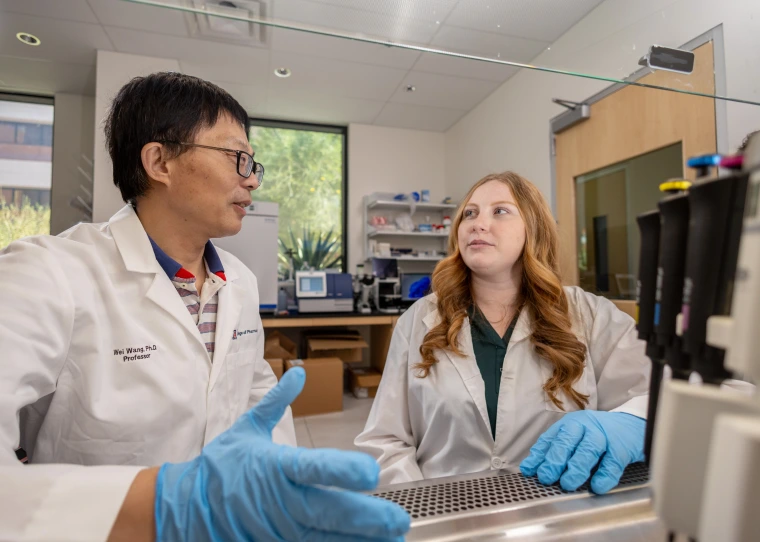T32 Integrative Training Program

From left, Professor Wei Wang meets withT32 scholar Alexis Cruickshank-Taylor in the Wang Lab on the University of Arizona campus.
Alexis Cruickshank-Taylor
Mentors: Wei Wang, PhD, and Sharad Khurana, MD
Alexis Cruickshank-Taylor is from Arizona and earned many academic distinctions prior to joining the Integrative Scholars Training Program including the prestigious BIO5 KEYS internship, the W.A. Franke Honors Silver Award, and the Dr. Thomas M. and Candace C. Grogan Scholar award. She said she wants to conduct research in a field that is focused on human health and disease and improving quality of life for patients. Cruickshank-Taylor’s research focuses on designing molecules that more effectively target murine double minute 2 (MDM2) activity for acute myeloid leukemia therapy.
“One of the classes I took as an undergrad was about anti-cancer drugs,” she said. “I found a new passion in learning about the mechanisms of current anti-cancer drugs and saw many opportunities to discover new ways to treat cancer.”
Cruickshank-Taylor applied for the T32 Integrative Scholars Training Program because she was excited about the opportunity to work closely with a laboratory and clinical mentorship team to maximize the translational impact of her research project.
Cruickshank-Taylor’s primary mentor is cancer center member Wei Wang, PhD, a UACC Clinical and Translational Oncology Program member and professor in the Department of Pharmacology and Toxicology in the R. Ken Coit College of Pharmacy. Wang also serves as co-director of the Arizona Center for Drug Discovery.
“The T-32 program provides unique research training opportunities and helps prepare the next generation of talented biomedical scientists, like Alexis, to become leaders in the field,” Wang said. “It’s training structure and focused resources keep them engaged and interested and ensures their academic success.”
Wang said that mentorships can help mentees gain valuable experience in cancer research.
“The mentors guide them to prioritize clinical impact while acquiring key skills in basic experimental, problem-solving, critical thinking, and cutting-edge technologies in oncology to prepare them for their next career stage,” he said. “This training program also helps to increase the diversity of people, particularly those from underrepresented groups, working in cancer research.”



